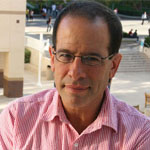Occupy movement's last big stand: Boston?

Occupy movement's last big stand: Boston?
- December 8, 2011
- David Meyer, sociology professor, is quoted in the Christian Science Monitor and Alaska Dispatch December 6, 2011
From the Christian Science Monitor:
The breakup of the camps has advantages and disadvantages for the Occupiers, says
David S. Meyer, a sociology professor at the University of California, Irvine, who
studies protest movements. 'The advantage of a geographical presence is visibility,
and giving people stuff to do.... A disadvantage is that your community is defined
by the people who show up, and that doesn't necessarily make for smart decisions."
Another drawback is that the encampments force the protesters to spend a lot of time
on housekeeping matters, at the expense of fighting for their ideals. "These general
assembly meetings at the camps mostly deal with logistics," Dr. Meyer says. "Taking
the occupation out of it means they have the time to focus on core issues, like income
equality. There's more active civil disobedience, and some protesters are even starting
to work in political campaigns. It should make for a more creative and diverse movement."
For the full story, please visit http://www.csmonitor.com/Business/2011/1206/Occupy-movement-s-last-big-s....
Share on:




connect with us